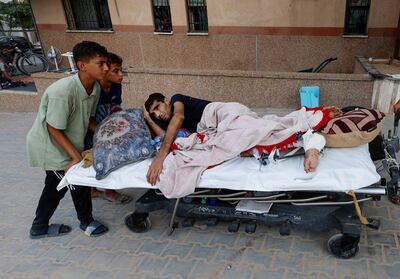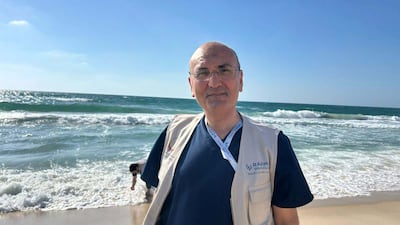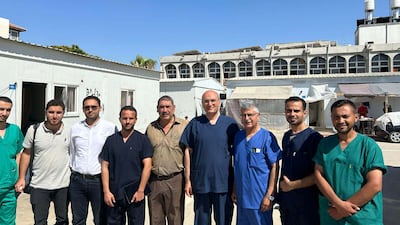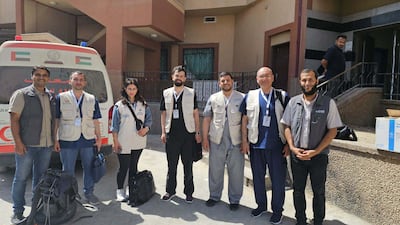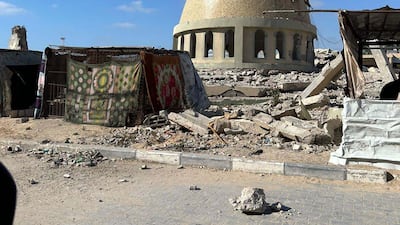Live updates: Follow the latest news on Israel-Gaza
A consultant neurosurgeon who answered the call to support Gaza's decimated health sector has described how hero medics in the war-torn enclave are delivering life-saving care amid chronic supply shortages and the persistent threat of Israeli air strikes.
Dr Maher Elayyan, a former head of the brain and neurosurgery unit at Jordan's King Hussein Cancer Centre, said he had to resort to using hand saws and manual drills to perform delicate brain surgeries at hospitals left “in ruins” from heavy bombardment.
Dr Elayyan, 51, who operates his own private clinic in Amman, volunteered to lend a crucial helping hand under a humanitarian mission organised by a US charity.
Doctors from countries such as Jordan, Egypt, Algeria, Pakistan and the US offered their expertise on the Gaza trip in June.
“My entire family was not only supportive of my decision but encouraged it,” Dr Elayyan told The National, who is now back in Jordan.
“Some of my children, despite their young age, wanted to accompany me, but that was not possible.”
The team was made up of 16 doctors specialising in anaesthesia, gynaecology, emergency medicine, orthopaedics, and urology, among others, who travelled at their own expense.
“This is the least we can do for our people in Gaza, and yet, we remain inadequate in our support,” said Dr Elayyan.
Hospitals on verge of collapse
The doctors worked at both the Al Nasser medical complex and the European Hospital in Gaza, witnessing first hand the devastation caused by a war now in its 10th month.
“Both hospitals were in ruins,” said Dr Elayyan.
“Al Nasser medical complex, after Israeli raids, was undergoing some rehabilitation, yet the medical staff continued providing services, including neurosurgery, despite the lack of materials.”
Dr Elayyan carried out 11 brain tumour surgeries with only the most basic of medical instruments at his disposal.
“We opened skulls using a manual drill and cut bones with hand saws,” he said.
He said the European Hospital was in slightly better condition but still lacked many essential supplies.
The limited materials and continued bombings severely restricted the number of surgeries.
“A four-month-old girl required surgery for a cranial deformity before she completed a year of age,” he said.
“I managed to close the skull joints causing pressure on her brain, and she improved and was discharged.”
Dr Elayyan recalled the challenging case of a two-and-a-half-year-old girl with a brain tumour that affected her ability to stand and swallow.
“The surgery was successful, and she showed signs of improvement, but she urgently needs further treatment outside Gaza,” he said.
“Without continued treatment, the tumour is likely to return.”
Another case involved a 54-year-old woman with a skull base tumour that had caused her to lose the ability to raise her left arm.
“Despite the complexity, the surgery was successful, and she improved without complications.”
All surgeries were performed without MRI scans, which he said was a basic requirement for anatomical study before surgery.
“MRI machines are unavailable throughout Gaza. We had to rely on CT scans instead,” he said.
Supply shortages were so severe that some operations were even delayed as gauze was unavailable.
Dr Elayyan commended Gaza's surgeons for carrying out complex surgeries in a war zone.
“Their knowledge and skills in handling cases like brain haemorrhages and injuries are impressive,” he said.
“Their need for help now is in materials, from gauze to major equipment and anaesthesia supplies, and nursing staff.”
Patients on ventilators evacuated
On his final day on duty, Dr Elayyan witnessed patients, some on ventilators, being forced to evacuate European Hospital under the threat of bombing.
“Messages were sent to everyone's mobile phones, giving them 24 hours to evacuate,” he said.
He said the hospital came under attack as soon as the evacuation was completed.
Dr Elayyan urged people to do everything in the power to help those suffering in Gaza.
“I urge anyone capable of helping to do so. The people of Gaza need actions, not words or Facebook posts,” he said.
“I want to return, and I'm not alone wishing to do so, everyone who has been there wants to go back and help as much as possible.”
He offered guidance to medical graduates who were prepared to overcome huge adversity in order to have the opportunity to help the needy.
Dr Elayyan said he and other doctors supervised exams for neurosurgery residents facing the sternest of tests.
“One candidate came without any sleep because his family's tent was bombed, and he spent the night securing them in another tent,” he said.
“Many graduated and others passed their exams and advanced to the next year.
“Despite the indescribable harsh conditions, these doctors are dedicated to learning and development.”
“Professionally, they are ready and capable with their excellent knowledge to practice their work.”
The UAE's journey to space
Killing of Qassem Suleimani
WHEN TO GO:
September to November or March to May; this is when visitors are most likely to see what they’ve come for.
WHERE TO STAY:
Meghauli Serai, A Taj Safari - Chitwan National Park resort (tajhotels.com) is a one-hour drive from Bharatpur Airport with stays costing from Dh1,396 per night, including taxes and breakfast. Return airport transfers cost from Dh661.
HOW TO GET THERE:
Etihad Airways regularly flies from Abu Dhabi to Kathmandu from around Dh1,500 per person return, including taxes. Buddha Air (buddhaair.com) and Yeti Airlines (yetiairlines.com) fly from Kathmandu to Bharatpur several times a day from about Dh660 return and the flight takes just 20 minutes. Driving is possible but the roads are hilly which means it will take you five or six hours to travel 148 kilometres.
match info
Chelsea 2
Willian (13'), Ross Barkley (64')
Liverpool 0
RESULT
Chelsea 2
Willian 13'
Ross Barkley 64'
Liverpool 0
UAE currency: the story behind the money in your pockets
Scoreline:
Everton 4
Richarlison 13'), Sigurdsson 28', Digne 56', Walcott 64'
Manchester United 0
Man of the match: Gylfi Sigurdsson (Everton)
Company%20Profile
%3Cp%3E%3Cstrong%3EName%3A%20%3C%2Fstrong%3EDirect%20Debit%20System%3Cbr%3E%3Cstrong%3EStarted%3A%3C%2Fstrong%3E%20Sept%202017%3Cbr%3E%3Cstrong%3EBased%3A%3C%2Fstrong%3E%20UAE%20with%20a%20subsidiary%20in%20the%20UK%3Cbr%3E%3Cstrong%3EIndustry%3A%3C%2Fstrong%3E%20FinTech%3Cbr%3E%3Cstrong%3EFunding%3A%3C%2Fstrong%3E%20Undisclosed%3Cbr%3E%3Cstrong%3EInvestors%3A%3C%2Fstrong%3E%20Elaine%20Jones%3Cbr%3E%3Cstrong%3ENumber%20of%20employees%3A%3C%2Fstrong%3E%208%3Cbr%3E%3C%2Fp%3E%0A
more from Janine di Giovanni
More from Neighbourhood Watch
UAE currency: the story behind the money in your pockets
Pharaoh's curse
British aristocrat Lord Carnarvon, who funded the expedition to find the Tutankhamun tomb, died in a Cairo hotel four months after the crypt was opened.
He had been in poor health for many years after a car crash, and a mosquito bite made worse by a shaving cut led to blood poisoning and pneumonia.
Reports at the time said Lord Carnarvon suffered from “pain as the inflammation affected the nasal passages and eyes”.
Decades later, scientists contended he had died of aspergillosis after inhaling spores of the fungus aspergillus in the tomb, which can lie dormant for months. The fact several others who entered were also found dead withiin a short time led to the myth of the curse.
The five pillars of Islam
Most wanted allegations
- Benjamin Macann, 32: involvement in cocaine smuggling gang.
- Jack Mayle, 30: sold drugs from a phone line called the Flavour Quest.
- Callum Halpin, 27: over the 2018 murder of a rival drug dealer.
- Asim Naveed, 29: accused of being the leader of a gang that imported cocaine.
- Calvin Parris, 32: accused of buying cocaine from Naveed and selling it on.
- John James Jones, 31: allegedly stabbed two people causing serious injuries.
- Callum Michael Allan, 23: alleged drug dealing and assaulting an emergency worker.
- Dean Garforth, 29: part of a crime gang that sold drugs and guns.
- Joshua Dillon Hendry, 30: accused of trafficking heroin and crack cocain.
- Mark Francis Roberts, 28: grievous bodily harm after a bungled attempt to steal a £60,000 watch.
- James ‘Jamie’ Stevenson, 56: for arson and over the seizure of a tonne of cocaine.
- Nana Oppong, 41: shot a man eight times in a suspected gangland reprisal attack.
Credit Score explained
What is a credit score?
In the UAE your credit score is a number generated by the Al Etihad Credit Bureau (AECB), which represents your credit worthiness – in other words, your risk of defaulting on any debt repayments. In this country, the number is between 300 and 900. A low score indicates a higher risk of default, while a high score indicates you are a lower risk.
Why is it important?
Financial institutions will use it to decide whether or not you are a credit risk. Those with better scores may also receive preferential interest rates or terms on products such as loans, credit cards and mortgages.
How is it calculated?
The AECB collects information on your payment behaviour from banks as well as utilitiy and telecoms providers.
How can I improve my score?
By paying your bills on time and not missing any repayments, particularly your loan, credit card and mortgage payments. It is also wise to limit the number of credit card and loan applications you make and to reduce your outstanding balances.
How do I know if my score is low or high?
By checking it. Visit one of AECB’s Customer Happiness Centres with an original and valid Emirates ID, passport copy and valid email address. Liv. customers can also access the score directly from the banking app.
How much does it cost?
A credit report costs Dh100 while a report with the score included costs Dh150. Those only wanting the credit score pay Dh60. VAT is payable on top.
Bib%20Gourmand%20restaurants
%3Cp%3EAl%20Khayma%0D%3Cbr%3EBait%20Maryam%0D%3Cbr%3EBrasserie%20Boulud%0D%3Cbr%3EFi'lia%0D%3Cbr%3Efolly%0D%3Cbr%3EGoldfish%0D%3Cbr%3EIbn%20AlBahr%0D%3Cbr%3EIndya%20by%20Vineet%0D%3Cbr%3EKinoya%0D%3Cbr%3ENinive%0D%3Cbr%3EOrfali%20Bros%0D%3Cbr%3EReif%20Japanese%20Kushiyaki%0D%3Cbr%3EShabestan%0D%3Cbr%3ETeible%3C%2Fp%3E%0A
PREMIER LEAGUE FIXTURES
Saturday (UAE kick-off times)
Watford v Leicester City (3.30pm)
Brighton v Arsenal (6pm)
West Ham v Wolves (8.30pm)
Bournemouth v Crystal Palace (10.45pm)
Sunday
Newcastle United v Sheffield United (5pm)
Aston Villa v Chelsea (7.15pm)
Everton v Liverpool (10pm)
Monday
Manchester City v Burnley (11pm)
Banthology: Stories from Unwanted Nations
Edited by Sarah Cleave, Comma Press
The specs
Engine: Long-range single or dual motor with 200kW or 400kW battery
Transmission: Single-speed automatic
Max touring range: 620km / 590km
Price: From Dh250,000 (estimated)
Read more from Mina Al-Oraibi
Mohammed bin Zayed Majlis
COMPANY PROFILE
Company name: BorrowMe (BorrowMe.com)
Date started: August 2021
Founder: Nour Sabri
Based: Dubai, UAE
Sector: E-commerce / Marketplace
Size: Two employees
Funding stage: Seed investment
Initial investment: $200,000
Investors: Amr Manaa (director, PwC Middle East)
More from Neighbourhood Watch:
The specs
Engine: 3.0-litre six-cylinder turbo
Power: 398hp from 5,250rpm
Torque: 580Nm at 1,900-4,800rpm
Transmission: Eight-speed auto
Fuel economy, combined: 6.5L/100km
On sale: December
Price: From Dh330,000 (estimate)
Dhadak 2
Director: Shazia Iqbal
Starring: Siddhant Chaturvedi, Triptii Dimri
Rating: 1/5

